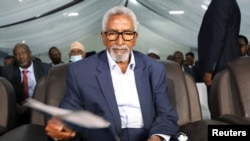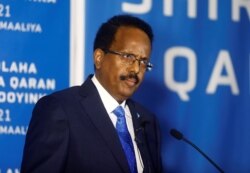Somalia's opposition politicians and the public have welcomed a deal to hold delayed indirect presidential elections in October, with lawmakers chosen in July and August. But analysts note unrest and terrorist attacks are still a risk.
Somalia’s opposition politicians welcomed the new election schedule reached Tuesday in Mogadishu after a meeting of federal and state leaders.
Lawmaker Mohamed Hassan Idris said the opposition was looking forward to a quick implementation to avoid further delays and unrest.
"So far, we have no concerns," Hassan said. "It is on a very welcoming stage; the schedule has been agreed by the leaders and the electoral committees, both from the federal and member states levels." He said leaders would need to continue discussions, "and we hope they continue to solve any likely obstacles.”
Process stalled
Somalia’s indirect elections were to take place in February, but the process was stalled over opposition concerns about free elections.
The opposition accused President Mohamed Abdullahi Mohamed, known as Farmajo, of stacking poll committees with his allies.
Farmajo denied the allegation but raised international eyebrows in April when he signed into law a two-year extension of terms in office, including his.
The move sparked days of street clashes in April in Mogadishu between split loyalty security forces, renewing fears of a return to clan violence.
Under international pressure, Farmajo nullified the extension and returned to talks with the opposition for holding elections.
The deal reached Tuesday was largely applauded by Mogadishu residents like university student Hassan Ahmed, 27.
He said he was happy and excited about the new election schedule. Some worried about the previous timeline, he said, and the disagreements between the leadership of the federal government and the regional states.
Election schedule
The indirect elections will begin in July with delegates chosen by clans selecting members of the lower house of parliament.
State governments will select senators beginning in August. The chosen lawmakers will then vote for the next president on October 10.
Despite the breakthrough, there is still a threat from al-Shabab militants, said independent security analyst Dahir Korow.
"Al-Shabab is trying to disrupt the Somali election process through suicide bombings and IED [improvised explosive device] attacks, mainly the venues of the process across the regions," Korow said. "However, it is also very significant to note that the democratic process will attract high-security alert both from Somali security agencies and their international peacekeeping partners such as AMISOM. Remember, the training and capacity building for Somali security agencies have been improving in recent years while al-Shabab’s have been decreasing."
The U.S. Embassy in Somalia urged continued constructive dialogue among Somali leaders to achieve peaceful and transparent elections.
Somalia originally planned to hold direct, one-person-one-vote elections, which would have been the first in decades. But the plan was scrapped in September because of a lack of infrastructure and concerns about security.





